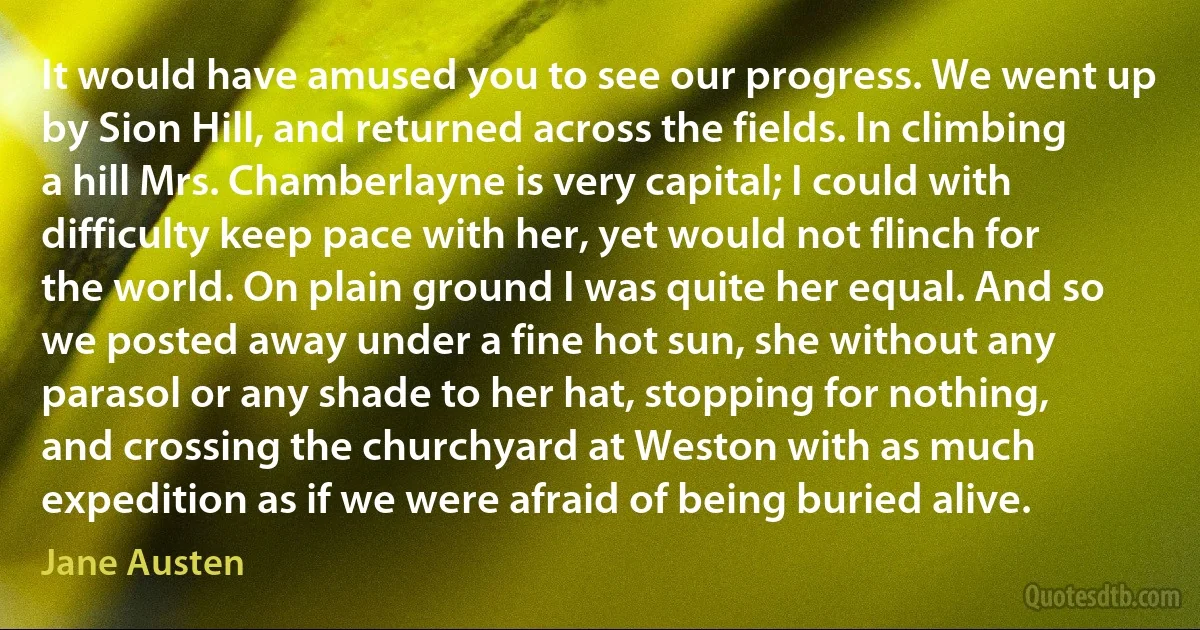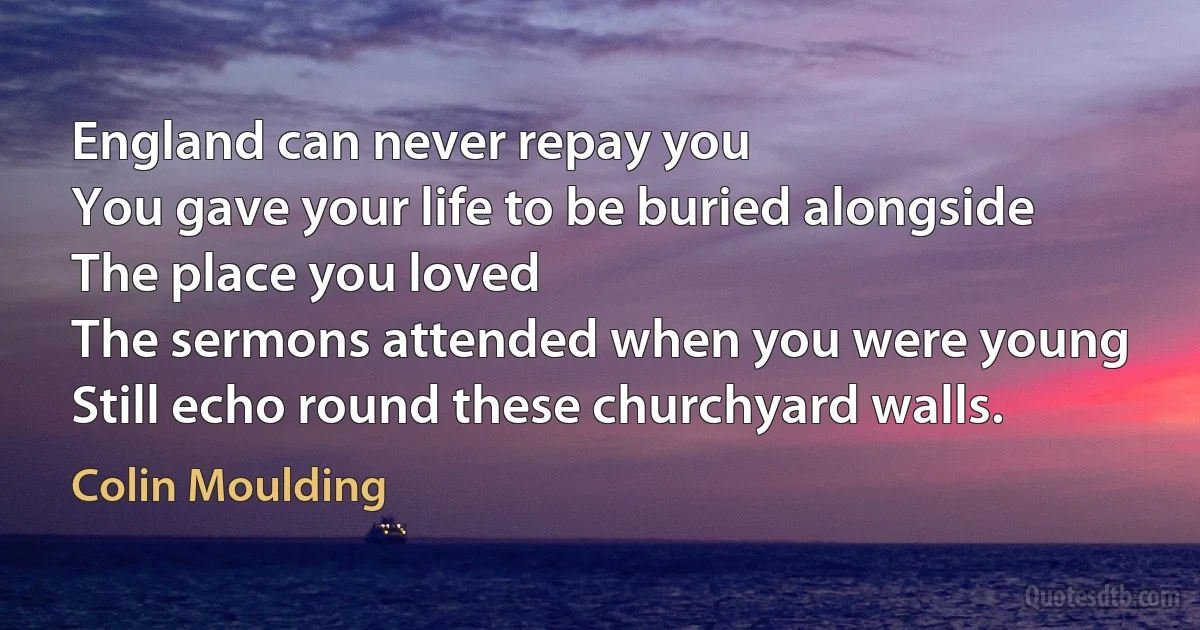Churchyard Quotes
No man is quite so much a hero in the dark as in broad daylight, in solitude as in society, in the gloom of the churchyard as in the blaze of the drawing-room. The season and the place may be such as to oppress the stoutest heart with a mysterious awe, which, if not fear, is near akin to it.

William H. Prescott
When stuck years ago in a job I hated, my only friend was the public bench. As the tedious mornings dragged on, how I would long for the lunch hour, when I would be able to escape the torture of the office and stroll over to the churchyard and into the comforting wooden embrace of one of its benches.

Tom Hodgkinson
So the baby was carried in a small deal box, under an ancient woman's shawl, to the churchyard that night, and buried by lantern-light, at the cost of a shilling and a pint of beer to the sexton, in that shabby corner of God's allotment where He lets the nettles grow, and where all unbaptized infants, notorious drunkards, suicides, and others of the conjecturally damned are laid.

Thomas Hardy
It is part of my duty as a decent member of my local hamlet to mow the grass in front of the church. It's a pleasant little task and mowing is a favorite activity of mine; it gives me a lot of pleasure to make the churchyard look tidy. I sometimes pause at the grave of someone or other and speculate what he might have been like when he was alive, but gravestones don't tell much.

Tom Baker
The belief that the body of the Virgin was not interred on earth, but was taken to heaven, has deprived them of all pretext for manufacturing any relics of her remains, which otherwise might have been sufficiently abundant to fill a whole churchyard; yet in order to have at least something belonging to her, they sought to indemnify themselves for the absence of other relics with the possession of her hair and her milk. The hair is shown in several churches in Rome, and at Salvatierra in Spain, at Macon, St Flour, Cluny, Nevers, and in many other towns. With regard to the milk, there is not perhaps a town, a convent, or nunnery, where it is now shown in large or small quantites. Indeed, had the Virgin been a wet-nurse her whole life, or a dairy, she could not have produced more than is shown as hers in various parts.

John Calvin
Do you know what I long for sometimes? To make a trip to Brabant. I should love to draw the old churchyard at Nuenen, and the weavers. To make, for instance, during a month, studies of Brabant, and to come back [to The Hague] with a lot of them, for a large drawing of a peasant funeral for instance.

Vincent van Gogh
This is the Court of Chancery, which has its decaying houses and its blighted lands in every shire, which has its worn-out lunatic in every madhouse and its dead in every churchyard, which has its ruined suitor with his slipshod heels and threadbare dress borrowing and begging through the round of every man's acquaintance, which gives to monied might the means abundantly of wearying out the right, which so exhausts finances, patience, courage, hope, so overthrows the brain and breaks the heart, that there is not an honourable man among its practitioners who would not give--who does not often give--the warning, "Suffer any wrong that can be done you rather than come here!"

Charles Dickens
When a labourer could no longer work, he had lost the right to live. Work was all they [the landowners] wanted from him; he was to work and hold his tongue, year in and year out, early and late, and if he could not work, why, what was the use of him? It was what he was made for, to labour and toil for his betters, without complaint, on a starvation wage. When no more work could be squeezed out of him, he was no better than a cumberer of other folk's ground, and the proper place for such as he was the churchyard, where he would be sure to lie quiet under a few feet of earth, and want neither food nor wages any more.

Joseph Arch
Each look'd upon his comrade's face,
Pale as funereal stone ;
Yet none could touch the other's hand,
For none could feel his own.
Like statues fixed, that gallant band
Stood on the dread deck to die ;
The sleet was their shroud, the wind their dirge,
And their churchyard the sea and sky.

Letitia Elizabeth Landon
It was a very aged, ghostly place the church had been built many hundreds of years ago, and had once had a convent or monastery attached for arches in ruins, remains of oriel windows, and fragments of blackened walls, were yet standing-, while other portions of the old building, which had crumbled away and fallen down, were mingled with the churchyard earth and overgrown with grass, as if they too claimed a burying-place and sought to mix their ashes with the dust of men.

Charles Dickens
It is a sensation not experienced by many mortals, said he, to be looking into a churchyard on a wild windy night, and to feel that I no more hold a place among the living than these dead do, and even to know that I lie buried somewhere else, as they lie buried here. Nothing uses me to it. A spirit that was once a man could hardly feel stranger or lonelier, going unrecognized among mankind, than I feel.

Charles Dickens
ROMEO to BALTHASAR But if thou, jealous, dost return to pry In what I further shall intend to do, By heaven, I will tear thee joint by joint And strew this hungry churchyard with thy limbs The time and my intents are savage-wild, More fierce and more inexorable far Than empty tigers or the roaring sea.

William Shakespeare



